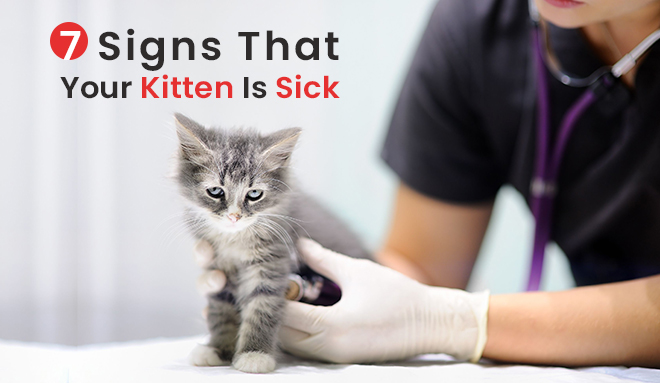Bringing home a new kitten is exciting, but it also comes with responsibility. Young cats are delicate and prone to various illnesses, and spotting the signs early is critical. Many pet parents ask, “how do I know if my kitten is sick?” Since kittens can’t tell you how they feel, it’s important to observe their behavior and physical symptoms.
Here are 7 signs that may indicate your kitten isn’t feeling well:
1. Pale or White Gums
Healthy kittens have light pink gums. If your kitten’s gums appear pale or white, it may indicate anemia, often caused by fleas or internal parasites. Severe anemia requires immediate veterinary care.
2. Lethargy
Kittens are usually curious and playful. If yours seems unusually tired or unwilling to move, it could be a sign of anemia, infection, diabetes, heartworms, or even neurological disorders. Prolonged lethargy warrants a vet visit.
3. Vomiting
Occasional vomiting can happen if a kitten eats too quickly. But frequent vomiting may signal infections, kidney or liver problems, pancreatitis, or toxin ingestion. If vomiting occurs more than twice in a day, seek veterinary advice.
4. Diarrhea & Swollen Stomach
Dietary changes can cause mild diarrhea, but persistent loose stools, loss of appetite, or a bloated belly often point to intestinal worms. Regular deworming—every 2 weeks until 3 months of age, then monthly—is essential for prevention.
5. Coughing, Sneezing & Wheezing
Respiratory infections in kittens can cause sneezing, watery eyes, nasal discharge, or difficulty breathing. Early treatment prevents complications, so don’t ignore these signs.
6. Urination Problems
If your kitten has accidents outside the litter box despite training, it could be due to a urinary tract infection (UTI). Frequent or painful urination always requires veterinary evaluation.
7. Itching, Skin Bumps & Excessive Licking
Persistent scratching, licking, or bumps on the skin are signs of fleas or ticks. These parasites not only irritate your kitten but also cause anemia and spread disease. Flea and tick preventatives are crucial for protection.
Final Thoughts
Kittens rely on you to recognize when something isn’t right. By asking yourself, “how do I know if my kitten is sick?” and staying alert to these symptoms, you can ensure early treatment and protect your kitten’s health. Regular vet visits, vaccinations, parasite control, and proper nutrition are key to raising a happy, healthy cat.
FAQs
1. How do I know if my kitten needs to see a vet?
If your kitten shows persistent vomiting, diarrhea, lethargy, or difficulty breathing, take them to the vet immediately.
2. What are the first signs of a sick kitten?
Early signs include pale gums, lack of appetite, vomiting, diarrhea, coughing, or unusual lethargy.
3. Can kittens recover from sickness at home?
Mild stomach upset may improve with hydration and rest, but most illnesses require veterinary diagnosis and treatment.
4. How can I prevent my kitten from getting sick?
Provide vaccinations, regular deworming, flea and tick preventatives, a balanced diet, and routine vet check-ups.
5. What home remedies can I give a sick kitten?
Offer clean water, keep them warm, and feed easily digestible food. But avoid self-medicating—always consult your vet first.


